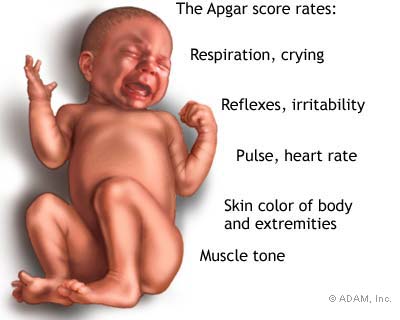How to Cope With the Stress of Being a New Parent

Making the decision to have a child is momentous. It is to decide forever to have your heart go walking around outside your body. ~ Elizabeth Stone
"Listen to the mustn'ts, child. Listen to the don'ts. Listen to the shouldn'ts, the impossibles, the won'ts. Listen to the never haves, then listen close to me ... Anything can happen, child. Anything can be."
-- Shel Silverstein
New 2011 SIDS Facts
view quiz statisticsNew Parent Concerns
After the celebrating the joy of your pregnancy, you will begin to plan for your baby's arrival. As you seek out advice and council you may discover there is a lot more to having a baby than you thought.
Top concerns with new parents are:
- Food/nutrition
- Work Schedules
- Child care
- SIDS (Sudden Infant Death Syndrome)
- Childhood Illness
- Finding a Pediatrician
- Finance
Quiz Source: Medicalnewstoday.com: New Infant Sleep Guidelines To Prevent SIDS, 5/2011
A Short Video on Baby's Development
Coping With Stress
All of the above concerns are valid and common among many new parents. Parents often wonder how they are going to be able to manage a new baby and prevent the stress that comes from having to adjust their lifestyle.
Work schedules and child care are areas that really weigh on the mind of those who have to return to work after a maternity leave. While a parent is at home with the child, the bonding is strengthened and it is difficult to think about having to separate from your precious little one.
As a former child care director, I walked many new parents through the process of leaving their little bundle of joy at a center. I always appreciated those parents who came with a list of questions and toured the building a couple of times (even four) before they decided to enroll their baby. I advise parents to talk with their sitters, nannies, or child care center, before the baby arrives to become acquainted with the environment and the caretaker. Some centers have monthly parent chats or coffee groups that meet to discuss concerns and to share parenting tips. This is a great time to ask those questions that concern you.
Although most babies are healthy from the start, they will encounter a cold or illness at some point. It is normal for infants to have three respiratory illnesses and two diarrhea infections during this stage of life. Parents should consult their doctor immediately with any concerns, even if it seems trivial. Many parents wonder if the illness is severe enough to make that phone call, or they do not want to dramatize the situation. Go ahead and call, it is better to consult your pediatrician than to guess what may be ailing your child.
Finance is a big area of concern with families. On average, the cost of raising a child to the age of 18 is $226,000. That's a lot of money and it doesn't include college! You have to figure that this covers food, clothing, vacations, medical expenses, child care costs and other occurring expenses. However, the desire to have a baby is much more important than the cost of having one. Experienced parents will tell you that no one is ever truly ready for a child when it comes to finance and it does turn out all right in the end.
Before the baby arrives, parents can reduce the financial stress by setting a family budget. Make a list of all your monthly expenses and discuss where you can make cuts in spending. You may find hidden costs that can be eliminated. Also, if one parent is considering staying home, keeping a part time job, or working from the home, this would be a great time to weigh the decision against your budget needs.
Apgar Score Factors

Parental Concern with Apgar Score
After your baby is born he or she will be given a test to determine his or her physical condition and to evaluate any immediate concern for medical attention. This test, called the Appearance, Pulse, Grimace, Activity, and Respiration (Apgar), will be administered by either the doctor, midwife, or nurse in the birthing or delivery room immediately after your baby is born.
Generally, the test is administered one minute after birth, and again five minutes after birth. The test is sometimes taken ten minutes later if the results of the second test are low and cause for concern. A score of 7, 8, or 9 is considered normal and indicates your newborn is in good health. A low Apgar score is not indicative of serious or long-term health problems nor does it predict your child's future health condition.
According to Dr. David Zieve, Medical Director, ADAM, Inc., and Dr. Neil Kaneshiro, Professor of Pediatrics, University of Washington School of Medicine, when an Apgar score is lower than 7 the newborn may need help adjusting to life outside the womb. The usual treatment is oxygen and clearing the infant's airway to help her or him breathe, and physical stimulation to increase heart beat.
The five factors used to evaluate your baby's overall condition are listed below in the Apgar Scoring chart. Each factor is assigned a value of 0 to 2, with 2 being the best score. Total scores vary from 0 to 10, with 10 being the highest possible score. (Source: MedlinePlus)
Although the idea of any test is of concern to new parents, the Apgar should be viewed as positive and beneficial to your newborn's overall well being. Should there be a concern, the provider will address the score and suggest follow-up care with you to ensure your baby develops appropriately.
Apgar Scoring Chart
Sign
| 2
| 1
| 0
|
|---|---|---|---|
Heart Rate (pulse)
| Normal: above 100 beats per minute
| Below 100 beats per minute
| Absent: no pulse
|
Breathing
| Normal rate and effort, good cry
| Slow or irregular breathing, weak cry
| Absent: no breathing
|
Grimace (responsiveness or relfex irritability)
| Pulls away, sneezes, cries or coughs with stimulation
| Facial movement only (grimace with stimulation)
| Absent: no response to stimulation
|
Activity (muscle tone)
| Active, spontaneous movement
| Arms and legs flexed with little movement
| No movement: floppy tone
|
Appearance (skin coloration)
| Normal color all over
| Normal color, but hands and feet are pink
| Bluish-gray or pale all over, feet are bluish
|
Note: Five Sign Category points are added together to obtain the Apgar Score.
| Source: Medline Plus (nlm.nih.gov); Kidshealth.org
|

Parenting Advice
The Stress Is Gone
I asked some new parents what the main stressor was in raising their baby. They all agreed that is was fear. They feared that they would not be able to raise their child well and they were uncertain of their parenting skills. One woman stated that she was afraid that she would not even be able to comfort her child and that the child may not bond with her.
This is all normal. I can remember being uncertain about holding my baby. I was nervous and tense when it came to picking him up for a feeding. Now, looking back, it seems trivial. I do not minimize the feelings that a new parent exhibits, just that after you gain confidence in yourself, it will all come naturally.
Here is what you gain in facing those fears:
- You learn that crying is a good thing. The baby's tears are wonderful and so are yours.
- You discover that you are a stronger person inside than you would have ever imagined.
- You discover that holding a baby is the most precious experience.
- You love more deeply, intimately. You see the world differently now and want everyone to enjoy it with you.
- You smile and radiate pure joy at the sight of your child and marvel at each little advancement she makes.
- You would face a giant rather than worry about what it takes to raise your child.
- You discover that your little bundle is a reflection of who you are and look forward to watching him grow through the years.
- You realize that those previous stress factors are no longer a threat. You have conquered your fears and are now riding high on the clouds the rest of the way.









